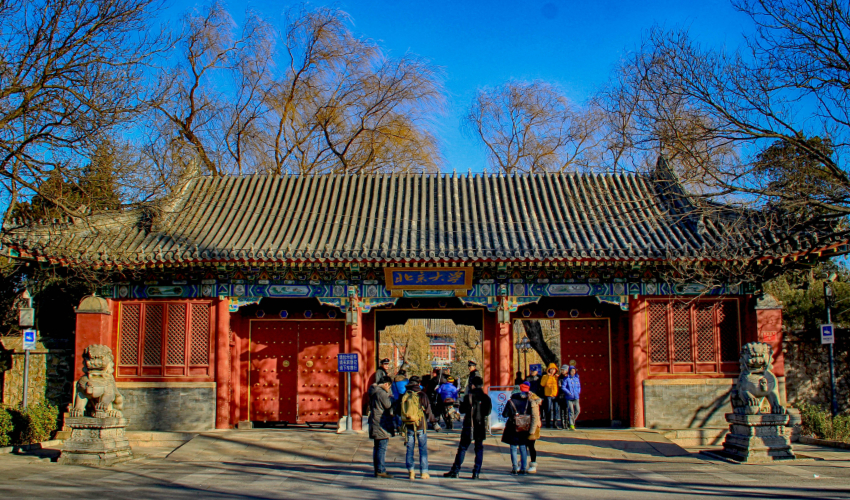In defense of the Yenching Academy

Late last week, NPR reported that the FBI had questioned at least five American graduates of the Yenching Academy, an English-language master’s program Beijing founded five years ago to replicate the soft-power successes of the West’s Rhodes and Marshall scholarships. I spent the last year at Yenching, and will be returning in September to complete my second year. Although I have become accustomed to the Trump administration’s “whole of government” effort to combat Chinese espionage and influence, for the first time it felt personal.
Intentionally or unintentionally, NPR’s reporting, particularly the headline of its text story — FBI questions American grads of China’s prestigious Yenching Academy— paints Yenching students as the sole target of an ongoing FBI probe, forever raising lurking and unanswerable questions about Yenching’s integrity and whether it is simply designed to churn out spies or useful idiots who parrot the Party line. The framing NPR used on “Up First,” one of the most-listened-to podcasts in the United States, was even worse: host Steven Inskeep introduced the story by asking, “Is China recruiting American students to spy on their country? NPR reveals the FBI has been questioning Americans who studied at an elite school in China. What raised their suspicions?”
These suggestive innuendos, left largely unanswered by NPR’s reporting and the FBI’s response to the story, will undermine the value of our degree and experience in the eyes of potential employers, make it more difficult for us to undertake a career in public service, and make it more likely that a fresh college graduate interested in bettering U.S.-China relations will view other career paths as a safer bet then heading to Yenching.
NPR could have easily avoided tainting Yenching without abrogating its responsibility to inform the public about the FBI’s activities. It could have, for example, explored whether the FBI is indeed solely targeting Yenching or rather has a comprehensive initiative aimed at all Americans who have studied in China. Or, it could have used the revelations as a backdrop to highlight the legitimate dangers facing American students in China, and the risks inherent in the U.S. government’s efforts to counteract those dangers. Although NPR broached these questions, they were framed as peripheral to the “mistrust of Yenching Academy.”
NPR also missed an opportunity to give current and former Yenching students a voice to discuss our experiences in a way that highlights to the public how ludicrous the FBI’s apparent suspicions about us are. Although I can only speak for myself, living under the day-to-day realities of China’s censorship and surveillance regime, with Google, YouTube and most news outlets blocked and my every move potentially tracked by CCTV cameras blanketing every street corner, has exposed me to the dangerous pathologies that the Party ascribes to, and has made me more skeptical of the Party’s ambitions on the world stage. While I want to see China and the Chinese people prosper, I have no interest in strengthening the rule of the Party by working as a spy or a stooge.
NPR also could have shed some light on what it is like to actually study at a Chinese institution during this particular moment in U.S.-China relations and Chinese politics. NPR’s readers and listeners could have learned, for example, that Yenching is not an institution that reinforces and demands loyalty to the Party line. Although the view and talking points of the Party are made evident in classroom discussions, foreign students have ample opportunity to deviate from that framework. On several occasions, I personally raised the issue of the Chinese government’s concentration-camp-like policies in Xinjiang, including to a former prominent diplomatic official with deep ties to the Party. Not once did I feel targeted, harassed or sanctioned for those comments, and often my classmates readily participated in the discussion.
In fact, by creating a hazy and unclear relationship between Yenching and the U.S. intelligence community, NPR has placed me and my fellow American students in more, rather than less, danger. If they were not already, Chinese intelligence agencies are now almost forced to devote more attention and resources to Yenching and its American students, putting everyone in the program into the position of being potential pawns for two of the most powerful and coercive intelligence agencies to ever exist.
This reality, and that all of this is taking place upon a backdrop where academic and scientific exchange of all kinds are framed as potential sources for undue Chinese influence, calls into question why the FBI became interested in Yenching in the first place. Are they really concerned with U.S. national security and the safety, well-being, and lives of American students in China, or have they reflexively become accustomed to searching for excuses to snuff out any instances of engagement between the two countries?
China is going to be a permanent fixture of the international order for the foreseeable future, and its influence in American society will only increase. The media must find a way to report on the impact Chinese espionage and influence has on American institutions without erroneously tarring those institutions or those associated with them, and the American intelligence community must find a way to counter China’s actions without implicitly raising questions about the loyalties of those committed to engagement.
More broadly, the United States must find a way to reconcile its disdain for China’s political system and its international ambitions with the need to build foundations of mutual understanding and trust, especially between young people. If the United States and China cannot, or are unwilling to, manage an activity as benign as academic exchange without allowing it to fall victim to their most paranoid tendencies, then they will certainly be unable to manage the numerous challenges that will inevitably beset the bilateral relationship going forward. Competition will subsume everything, making misunderstanding, mistrust and eventually conflict all but inevitable.





